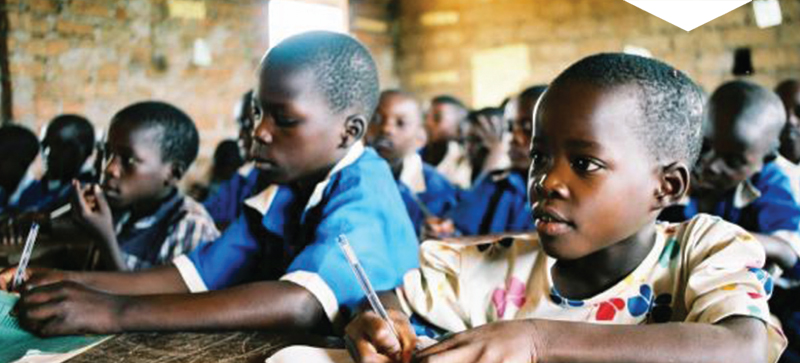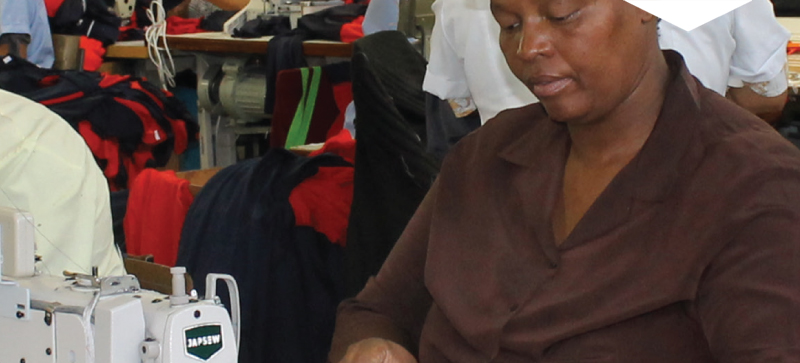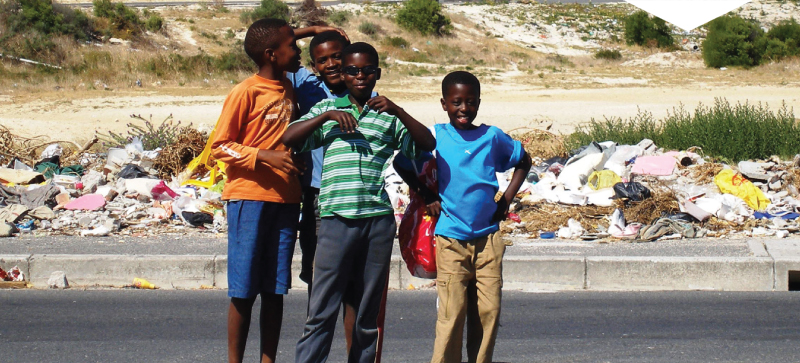Overcoming the legacy of poverty and inequality
South Africa in 1994 was a country marked by extreme poverty and inequality. The preceding decades of social and economic discrimination had left a legacy of adversity, which had been founded on racial divides. Millions of primarily black South Africans were mired in deplorable living conditions, lacking access to basic services such as running water, electricity and clean sanitation. The schooling and health systems that served the majority of the population were also inadequate.
Two decades later, South Africa’s story is one of both achievement and continuing challenges. There has been undeniable progress on several fronts: the introduction of the new constitution in 1996, increased access to basic services, and the roll-out of the largest antiretroviral (ARV) programme in the world. Additionally, millions of South Africans are now beneficiaries of government grants and the large majority of children are enrolled in school.
Despite these victories, the country still faces challenges that affect the day-to-day lives of many South Africans. Unemployment rates are high, access to quality services remains uneven, the education system is dysfunctional for all but the top 20% of schools, and crime and corruption are rife.
Closely linked to each of these is the conundrum of poverty and inequality. During the post-apartheid period, overall poverty in South Africa has decreased, but only marginally, according to research led by Professor Murray Leibbrandt, DST/NRF SARChI Chair in Poverty and Inequality, published in the Oxford Companion to the Economics of South Africa. The proportion of people living below the poverty line decreased from 56% in 1993 to 54% in 2010 and, while government grants have had a significant impact, a substantial proportion of South Africans remain in severe poverty.
 In terms of inequality, the gap between the rich and poor has increased during the last 20 years, in terms of both overall income inequality and inequality within racial groups, particularly black Africans. In 1993, the richest 20% of people earned 66% of the total income in the population and the poorest 60% together earned about 16% of the total income. By 2010, these figures had changed, with the richest 20% of people earning about 70% of the total income in the population and the poorest 60% together only earning about 10% of the total income. In recent years, the Gini coefficient (a measure of inequality of distribution) has hovered around 0.69, making South African society one of the most unequal in the world.
In terms of inequality, the gap between the rich and poor has increased during the last 20 years, in terms of both overall income inequality and inequality within racial groups, particularly black Africans. In 1993, the richest 20% of people earned 66% of the total income in the population and the poorest 60% together earned about 16% of the total income. By 2010, these figures had changed, with the richest 20% of people earning about 70% of the total income in the population and the poorest 60% together only earning about 10% of the total income. In recent years, the Gini coefficient (a measure of inequality of distribution) has hovered around 0.69, making South African society one of the most unequal in the world.
At UCT, researchers across a wide variety of academic disciplines – from engineers to economists, geographical scientists to sociologists, physiotherapists to political scientists – are involved in documenting and understanding these changes, as well as developing appropriate responses to the continuing challenges that relate to the twin burdens of poverty and inequality. Launched late in 2013, the fourth of the Vice-Chancellor’s Strategic Initiatives – the Poverty and Inequality Initiative (PII) – was set up to tackle the question of why, in a country of rich resources, poverty and inequality are persisting and even, in the case of inequality, deepening. With its members drawn from diverse disciplines, the PII aims to identify all major role players inside and outside the university (including academics, research groups and non-governmental organisations) who are doing work related to poverty alleviation, whether in policy or aimed at intervention.
Employment and unemployment
One of the key drivers of poverty and inequality in South Africa is undoubtedly the labour market. The persistently high levels of unemployment, as well as rising inequalities in earnings that have marked the post-apartheid era, have prevented any meaningful reduction in poverty and inequality.
In 1995, the unemployment rate was 15.7%, according to Statistics South Africa. By 2003, this figure had almost doubled, with unemployment reaching a record high of 31.2%. Although the economy had generated a fair number of jobs, the number of individuals entering the labour force over this period was significantly greater, thus leaving more than five million South Africans without work. After some fluctuation, in 2010 unemployment rates were at 25.3%.
 While much research has been generated, the knowledge base on South African unemployment – and its inter-relatedness with poverty and inequality – is fragmented and many gaps in research and policy debates are apparent. It is against this backdrop that the Research Project on Employment, Income Distribution and Inclusive Growth (REDI3x3) was conceived. Launched in 2012, REDI3x3 is a national multiyear, collaborative, independent research initiative funded by the National Treasury and managed by UCT’s Southern Africa Labour and Development Research Unit (SALDRU). The project is designed to forge a stronger engagement between research and policymaking and to promote dialogue across disciplines and paradigms. By generating an independent, rich and nuanced knowledge base and expert network, it intends to contribute to co-ordinated, consistent and effective policies directed at the three critical problem areas of unemployment, inequality and poverty.
While much research has been generated, the knowledge base on South African unemployment – and its inter-relatedness with poverty and inequality – is fragmented and many gaps in research and policy debates are apparent. It is against this backdrop that the Research Project on Employment, Income Distribution and Inclusive Growth (REDI3x3) was conceived. Launched in 2012, REDI3x3 is a national multiyear, collaborative, independent research initiative funded by the National Treasury and managed by UCT’s Southern Africa Labour and Development Research Unit (SALDRU). The project is designed to forge a stronger engagement between research and policymaking and to promote dialogue across disciplines and paradigms. By generating an independent, rich and nuanced knowledge base and expert network, it intends to contribute to co-ordinated, consistent and effective policies directed at the three critical problem areas of unemployment, inequality and poverty.
There has been undeniable progress on several fronts: the introduction of the new constitution in 1996, the establishment of an independent judiciary, increased access to basic services, and the roll-out of the largest ARV programme in the world.
With such critical levels of unemployment, job creation remains high on the policy agenda. However, there are several hurdles to employment in the South African context – skills shortages, the efficiency of labour and non-labour market regulations, and support for labour-market institutions. The Employment Promotion Programme (EPP), based in the Development Policy Research Unit (DPRU), aims to identify and implement solutions to these systematic employment constraints. Funded by the United Kingdom’s Department for International Development (DfID), projects supported by the EPP fall into three categories: knowledge and intelligence gathering, capacity-building support for the labour market and other relevant institutions, and support for innovative pilot interventions.
A potential constraint to employment, which has come under much scrutiny recently, is the setting of minimum wages. There is ongoing debate as to whether minimum wages in certain sectors of South Africa’s economy are set too high and therefore price workers out of the labour market, which in turn exacerbates unemployment. Research on this issue by professors Nicoli Nattrass and Jeremy Seekings at the Centre for Social Science Research (CSSR) attracted widespread media attention in early 2013. Their ongoing analysis of the crisis in the clothing industry suggests that the imposition of minimum wages in this labour-intensive sector is threatening thousands of jobs. However, this has been robustly criticised by researchers at UCT’s Institute of Development and Labour Law and is the topic of ongoing debate. The research and this debate raise some difficult policy dilemmas: given the exceptionally high levels of unemployment, how should policymakers balance the goal of job creation with the goal of achieving decent, well-paid work? Should low-wage employment be permitted because it mitigates poverty, even if wages are very low?
Minimum-wage legislation has also been a focus of research at the DPRU. Here the aim has been to understand and measure the enforcement of minimum-wage laws. Funded by the International Development Research Centre (IDRC), the project has three distinct components: one measuring the enforcement of sectoral minimum-wage laws and the causal effect of enforcement on compliance with them, another looking at the nature, role and functioning of the regulatory agencies involved in the monitoring and enforcement of minimum-wage laws, and the last measuring the impact of minimum-wage laws on employment and other labour-market outcomes.
One of the most visible changes in South African cities over the last 20 years has been the pattern of residential integration and segregation.
Some of the findings from this project raise interesting questions in the light of the recent protests over farm workers’ wages in the Western Cape. Research by Professor Haroon Bhorat, director of the DPRU and DST/NRF SARChI Chair in Economic Growth, “Poverty and Inequality: Exploring the Interactions for South Africa”, together with colleagues, shows that, since the implementation of the sectoral minimum-wage law in agriculture in 2003, average wages in agriculture have increased significantly across all provinces. In the Western Cape, where compliance has been one of the highest, farm workers also earn substantially more than in other provinces. To understand why the strikes then occurred in this province and not others, a research project led by Professor Lungisile Ntsebeza, DST/NRF SARChI Chair in Land Reform and Democracy in South Africa, and colleagues from the Centre for African Studies, has started collecting data on the strikes with the aim of providing a detailed account of events between August 2012 and February 2013. The second phase of the research project will attempt to locate the strikes within the broader context of rural resistance and transformation, not only in the countryside, but in the country as a whole.
The role of small business in job creation
In South Africa, small, medium and micro enterprises (SMMEs) play a vital role in job creation. However, these entities face a number of constraints that make it difficult to operate and expand into larger profitable entities. Various interventions have been designed to support SMMEs so that they can overcome these obstacles. During 2013, J-PAL Africa, based in SALDRU, ran an evaluation of a project by the Business Bridge Initiative. The project targets individuals who already own micro enterprises and gives them the skills required to expand their operations in terms of revenue, profit and number of employees. By providing skills to owners of small existing businesses, the hope is that these businesses will grow to the point where they can provide employment for those without self- or wage-employment.
Another research project looking at micro enterprises is being run by Dr Margaret Booyens from the Department of Social Development and Associate Professor Roshan Galvaan from the Department of Health and Rehabilitation Sciences. The project, titled “Youth-Owned Small-scale Enterprise Development: Pathways to success”, explores how the agency of young people is activated and supported to advance successful business development. During 2013, Dr Booyens and Associate Professor Galvaan interviewed young South African citizens between the ages of 20 and 29, living in Saron, Montagu and Citrusdal, who had been running their own legal small businesses for two or more years.
UNEQUAL education
Many scholars agree that education is a critical ingredient of any strategy to redress deep-seated structural inequality, but in South Africa, the education system itself is highly unequal.
When the newly elected democratic government took office in 1994, it inherited a dysfunctional education system. Over the last two decades, the government has instituted a plethora of policies to address the inequalities and deficiencies, but today, after a string of reforms in school access, curriculum, teacher training, governance and financing, the performance of the bulk of South Africa’s education system is catastrophically poor. While resources flow more equitably and access to education has expanded significantly, educational outcomes for the vast majority of learners continue to be poor. Despite receiving a relatively large slice of the public pie, the prevailing story of education in South Africa is one of high student dropout rates, low completion rates and dismal achievement levels. Indeed, comparative international assessments in reading and literacy, mathematics and science locate the performance of South Africa’s schools as worse than most other African countries. According to the 2014 World Economic Forum Global Information Technology Report, South Africa is last out of 148 countries in terms of its maths and science education.
What are some of the reasons for this poor performance? Typically, research attempting to explain these continuing shortfalls observes factors such as poor teacher training, a weak curriculum and learning deficits in primary school. A new research project looks instead at the relative influence of political and institutional constraints in accounting for poor schooling outcomes. This project, titled “The Provision of Basic Education in South Africa: Institutional and political challenges”, is a multiyear, multilevel study, undertaken jointly by the Graduate School of Development Policy and Practice, the Department of Political Studies and the School of Education, in partnership with the University of Manchester’s Effective States and Inclusive Development Research Centre. Over the course of three years, the researchers plan to collect data at the national, provincial and school level in order to explore the extent to which the performance of schools can be explained as an outcome of the interactions between, on the one hand, the prevailing political dynamics and, on the other, the characteristics of the prevailing institutional arrangements.
Analyses of learner performance in South Africa reveal that there is a small proportion (about 25%) who perform relatively well. However, the vast majority have extremely poor achievement outcomes. Essentially, there are two different education systems in South Africa: a functional schooling system that caters for the rich and a largely dysfunctional schooling system catering for the majority of poor learners. While schools in the former system are becoming increasingly deracialised, this dual pattern of schooling in South Africa continues to reflect the lines of apartheid’s historical geography.
Research led by Professor Pam Christie at the School of Education is exploring these differentiated spatial patterns of schooling in South Africa. Through a comparative study in three regions, she aims to investigate the spatial practices, representations of space and lived experiences of these schools, with a view to understanding how inequalities are constituted and how they might be shifted. During 2013, Professor Christie and her team developed the conceptual and theoretical framing for their research. They are currently gathering and mapping information about patterns of schooling in the Western, Eastern and Northern Cape.
While poor schooling outcomes during the post-apartheid era have painted a rather dismal picture of education in South Africa, it is possible to identify schools in poorer contexts that are performing better than others, thus presenting a more nuanced account. The SPADE (Schools Performing Above Demographic Expectations) Project, also located in the School of Education, looks at a sample of primary schools in the Western Cape that are performing above expectations, given their low socio-economic contexts. SPADE researchers are interested in what contributes to better performance in these schools. They include three domains in their research: the home, school organisation and the classroom.
Preliminary findings suggest that higher-performing schools have certain organisational features that contribute to their success, such as consensual relations between staff in the school and an absence of enduring, explicit conflict, low teacher and student absenteeism and a strong ethic of care for the child. At the classroom level, researchers have identified certain effective pedagogic strategies – related to pace, sequence and coherence of the lesson – in higher-performing schools in lower-income communities. Their analysis also shows that schools perform optimally when management is able to draw on their knowledge and experience regarding pedagogy, curriculum and evaluation to fulfil their management responsibilities with authority.
Vulnerable groups
Promoting greater equity and access to education and development opportunities is key to guaranteeing the rights of children. Since 1994, many policies and interventions have been designed to ensure that the rights of children, along with those of other vulnerable groups, such as women and people with disabilities, are realised.
Vulnerable groups constitute a significant proportion of the population and experience a higher risk of poverty and social exclusion than the rest. In South Africa, women, children and people with disabilities often face serious challenges that make them particularly vulnerable to further impoverishment and exclusion.
 The White Paper on Social Welfare, adopted in 1997, has formed the basis for social welfare policy in South Africa over the post-apartheid era. In 2013, Professor Viviene Taylor, head of the Department of Social Development, was appointed by the national Minister of Social Development to chair the Ministerial Committee on the Review of the Implementation of the White Paper on Social Welfare. The primary research aim of the committee is to review how the vision, goals and objectives of the white paper are being implemented across the country, and the impacts on poverty, social inequality and vulnerability. Using a combination of methods, including reviews and analysis of official documents, reports and existing research on the status of social welfare across South Africa, the committee will identify the critical gaps and challenges in the provision of social development services.
The White Paper on Social Welfare, adopted in 1997, has formed the basis for social welfare policy in South Africa over the post-apartheid era. In 2013, Professor Viviene Taylor, head of the Department of Social Development, was appointed by the national Minister of Social Development to chair the Ministerial Committee on the Review of the Implementation of the White Paper on Social Welfare. The primary research aim of the committee is to review how the vision, goals and objectives of the white paper are being implemented across the country, and the impacts on poverty, social inequality and vulnerability. Using a combination of methods, including reviews and analysis of official documents, reports and existing research on the status of social welfare across South Africa, the committee will identify the critical gaps and challenges in the provision of social development services.
Professor Taylor, together with two research assistants, is collating and analysing the data collected by the committee and writing up initial briefs on the findings. A number of these research outputs will be developed into articles, policy briefs and status reports. The process will also be written up and will be used for teaching on social-policy courses in the department.
The Children’s Institute (CI) has also played a key role in assisting the national Department of Social Development to design a comprehensive legal solution to the foster care crisis. There is substantial evidence that the foster care system is under serious strain and, as a result, many vulnerable children are left without assistance.
Vulnerable groups constitute a significant proportion of the population and experience a higher risk of poverty and social exclusion than the rest of the population.
To date, the work of the CI has included conducting research for the department, together with the Community Agency for Social Enquiry, on the challenges and proposing options for reform; drafting regulations to show how reform options could be translated into law; creating dialogue platforms to promote discussion with government and civil society; and participating in litigation to get clarity on Children’s Act clauses on foster care eligibility.
While government grants are particularly useful in providing financial assistance, there are challenges faced by children that require different types of interventions. In South Africa, violence against children, especially in the context of poverty, occurs at a very high rate. Poverty is a particular risk for violence against children, as poor parents are less likely to have social support, more likely to use harsh, inconsistent parenting, less likely to be affectionate towards and to monitor their children, and more likely to use corporal punishment.
Effective interventions in the form of parenting programmes are needed to improve parenting and buffer the effects of poverty on children, and researchers in the Department of Psychology have undertaken to develop and test parenting programmes that will be appropriate in South Africa and other low- and middle-income countries. With the aim of developing programmes suitable for low-resource contexts, Associate Professor Cathy Ward and Inge Wessels are training community health workers to deliver the programmes, producing materials that are low cost, and making them freely available. To date, the testing of various programmes for different age groups has found significant improvements in positive parenting behaviour. The researchers plan to test each programme in at least two other low- or middle-income countries, and hope to have them ready for widescale rollout by 2020.
Women are, of course, also victims of violence, and as a vulnerable group are over-represented among the poor; they also bear the brunt of the HIV/AIDS pandemic in South Africa. A recent study by researchers in the Department of Health and Rehabilitation Sciences explored methods to mitigate the consequences of living with HIV/AIDS in this environment. With the effective rollout of antiretroviral treatments in South Africa, the profile of HIV as a disease has changed, from being a terminal illness to a chronic disease, much like diabetes. From this standpoint, it is important to address the symptoms associated with HIV/AIDS in order to maximise quality of life and participation in society; one of the most common symptoms in people with HIV/AIDS is pain, which can be addressed.
People with disabilities also face serious challenges that marginalise and exclude them from participating meaningfully in society. Associate Professor Theresa Lorenzo and a team of researchers from the Disability Studies Programme at the Department of Health and Rehabilitation Sciences are involved in a multiyear collaborative study on disabled youth. The study is being run by occupational therapy departments at six universities, together with community-based organisations across five provinces in South Africa.
The findings of the study give a picture of the inequalities faced by disabled youth and the factors that enable them to sustain their livelihoods. They show that disabled youth face significant barriers to education and employment and they have limited opportunities for social interaction and intimate relationships. The results also showed that community rehabilitation workers are well positioned to promote equal citizenship for disabled youth.
A shared aim
This and other research at UCT shows that the university is well on its way to gearing up and mobilising its resources to frame a co-ordinated, coherent response to the enduring challenges of poverty and inequality. This response will be profiled in the work of the national Carnegie3 initiative, the first phase of which was launched with the “Strategies to Overcome Poverty and Inequality” conference hosted by UCT in September 2012.
The core focus of the PII during the early months of 2014 was the identification and development of key research themes that would form the basis of the university’s engagement with the Carnegie3 initiative. The structures that will support the process are firmly in place with a shared aim to collectively generate more effective interventions.
Using the considerable expertise of its members, the Poverty and Inequality Initiative will focus on themes such as inclusive growth, urban development, rural development, labour markets, education, health, and issues of social cohesion/community/crime – these themes resonate well with research already under way at UCT, and further afford opportunities for creating previously unexplored synergies, not only among researchers within the UCT community, but also expanding outward. The Poverty and Inequality Initiative is thus poised to play a key role in brokering these relationships and guiding the university’s input into the national endeavour.


